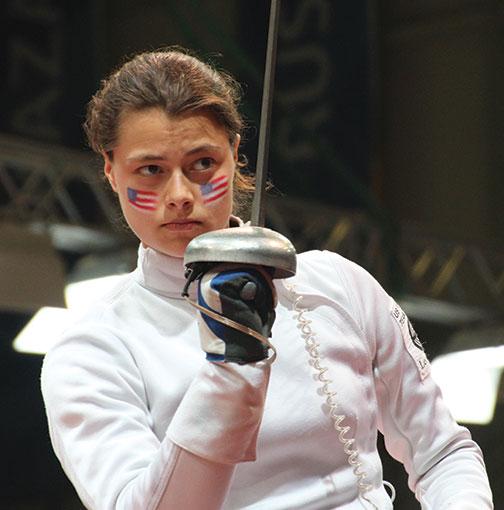

As a child, Kat Holmes ’17 dreamed of medieval times. She devoured Tamora Pierce’s Song of the Lioness, a series of books about Alanna of Trebond, a girl who disguises herself as a boy to become a knight.
Holmes took up fencing. She wanted to follow in Alanna’s footsteps and work her way up from page to squire to knight.
Today, Holmes is the top-ranked women’s epee fencer in the country and is on the verge of being selected to represent the United States at next year’s Olympic Games in Rio de Janeiro. If chosen, she said, her journey to knighthood will be complete.
This year has been a “breakthrough” season for Holmes, said Zoltan Dudas, head coach of the Princeton fencing teams. On her way to the top of the U.S. leaderboard, Holmes has beaten a number of the world’s top 16 fencers, including two-time Olympic gold medalist Tatiana Logunova of Russia.
To beat Logunova, Holmes and Dudas analyzed video of the fencer and painstakingly cataloged her every action in an Excel spreadsheet of Dudas’ design. They searched for patterns in the data, eventually coming up with a novel strategy for Holmes: frequently varying the distance at which she positioned herself from Logunova, sometimes closing in and other times backing up.
Holmes rehearsed the strategy over and over in her mind until her nerves faded and she could see herself winning. What was a 15–5 defeat against Logunova last year became a 15–12 coup this July.
“Her biggest strength is that she can focus at the maximum level for a much longer time than her opponents,” Dudas said of Holmes.
Between training sessions, Holmes works in Associate Professor Yael Niv’s computational neuroscience lab, conducting research on how the brain makes decisions. She finds that her knowledge of psychology and neuroscience often aids her in training.
“You can strengthen the same neural networks by visualizing an activity as [you can] by actually doing it,” she said. “It obviously doesn’t make you stronger, but it can help ingrain the activity in your mind and potentially make those neural networks transit faster.”
The path to knighthood, it appears, may be less about physical skill and more about mental toughness, as Alanna of Trebond demonstrated. Pierce, the author who created Alanna, said she wishes Holmes well and is “pleased as punch” to have inspired a real-life knight.
